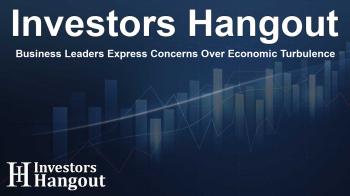Business Leaders Express Concerns Over Economic Turbulence

Significant Decline in CEO Confidence Observed
The latest findings from a respected survey reveal that small and midsize business (SMB) CEOs are experiencing a profound dip in confidence in the economy, particularly in Q1 2025. The Vistage CEO Confidence Index has reported a dramatic 22-point decrease this quarter, dropping from 100.8 to 78.5. This downturn can largely be attributed to increasing concerns about tariffs and inflation affecting the business landscape.
The Shift in Economic Sentiment
According to Joe Galvin, Vistage's chief research officer, the significant decrease in confidence starkly contrasts the optimism observed in the previous quarter. Galvin noted that while such a drastic change might typically signal alarm, it represents a return to levels reminiscent of Q3 2023. The prior high had likely fueled hopes surrounding forthcoming policy changes, while current sentiments encapsulate the harsh realities of persisting economic troubles.
Key Economic Indicators
Vistage has been assessing SMB CEO sentiment regarding economic circumstances since 2003. Their method, which is based on ITR Economics' rate-of-change analysis, has confirmed that the Vistage CEO Confidence Index serves as a predictive gauge, often signaling shifts in the U.S. Industrial Production Index approximately nine months ahead.
Concerns Over Tariffs and Inflation
One of the most pressing issues highlighted by SMB CEOs is the concern over trade and tariff policies. Research indicates that a startling 69% of CEOs predict these policies will adversely affect their businesses. This sentiment underscores the broader economic anxiety pervasive among business leaders today.
When asked about the overall economic conditions over the last year, 41% of CEOs acknowledged that they have deteriorated, with 42% expressing fears that the economy will continue to decline in the coming year.
Challenges in Workforce Management
The struggle to find and retain qualified employees is another pressing challenge. Despite the current uncertain economic environment, around 45% of CEOs are planning to increase personnel in the near future, albeit 14% are considering downsizing their hiring efforts. Such sentiments mirror trends seen during the pandemic and previous recessions.
Impact of Government Spending Changes
Changes in government spending have also raised alarms among business leaders. When surveyed, CEOs indicated a range of anticipated impacts:
- 10% expect direct consequences such as cuts in government orders, grants, or contracts.
- 32% foresee indirect impacts like cuts to government-related contracts for both customers and vendors.
- 20% anticipate both direct and indirect consequences from government spending alterations.
Pricing Strategies in a Volatile Market
Amidst the economic uncertainty, many companies are proactively increasing their prices. In fact, 44% of CEOs reported raising prices recently, with 51% planning further increases within the next quarter, with a notable 13% forecasting hikes exceeding 10%.
The Role of AI in Business Operations
Interestingly, the adoption of artificial intelligence (AI) tools is rising among business leaders. A recent survey found that 70% of CEOs and 61% of leadership teams utilize AI in their operations, significantly outpacing the 55% of individual employees who employ AI technology. Moreover, 47% of CEOs are prioritizing training to ensure that their teams utilize generative AI effectively.
Conclusion: The Path Forward for SMBs
The current landscape for small and midsize businesses is fraught with challenges, primarily revolving around economic uncertainty, tariffs, and workforce management issues. While concerns are significant, many leaders remain committed to navigating these turbulent waters. They are adopting pricing strategies, leveraging technology, and strategically planning for the future. It remains to be seen how these factors will unfold in the coming months.
Frequently Asked Questions
What is the Vistage CEO Confidence Index?
The Vistage CEO Confidence Index is a measure that surveys SMB CEOs regarding their sentiment on various economic factors and is regarded as a leading economic indicator.
Why did CEO confidence drop in Q1 2025?
CEO confidence dropped due to heightened concerns about tariffs and inflation, leading to significant economic unease among small and midsize business leaders.
How do tariffs affect small businesses?
Tariffs can lead to increased costs for businesses, impacting profitability and forcing many to adjust their pricing strategies, which can adversely affect consumer spending.
What challenges are CEOs facing regarding workforce management?
Many CEOs are struggling to find and retain qualified employees, with the challenges reflecting broader economic uncertainties.
How is AI being utilized by business leaders?
A significant portion of CEOs and leadership teams are integrating AI into their operations to enhance efficiency and effectiveness, with many investing in training their employees on these technologies.
About The Author
Contact Kelly Martin privately here. Or send an email with ATTN: Kelly Martin as the subject to contact@investorshangout.com.
About Investors Hangout
Investors Hangout is a leading online stock forum for financial discussion and learning, offering a wide range of free tools and resources. It draws in traders of all levels, who exchange market knowledge, investigate trading tactics, and keep an eye on industry developments in real time. Featuring financial articles, stock message boards, quotes, charts, company profiles, and live news updates. Through cooperative learning and a wealth of informational resources, it helps users from novices creating their first portfolios to experts honing their techniques. Join Investors Hangout today: https://investorshangout.com/
The content of this article is based on factual, publicly available information and does not represent legal, financial, or investment advice. Investors Hangout does not offer financial advice, and the author is not a licensed financial advisor. Consult a qualified advisor before making any financial or investment decisions based on this article. This article should not be considered advice to purchase, sell, or hold any securities or other investments. If any of the material provided here is inaccurate, please contact us for corrections.

